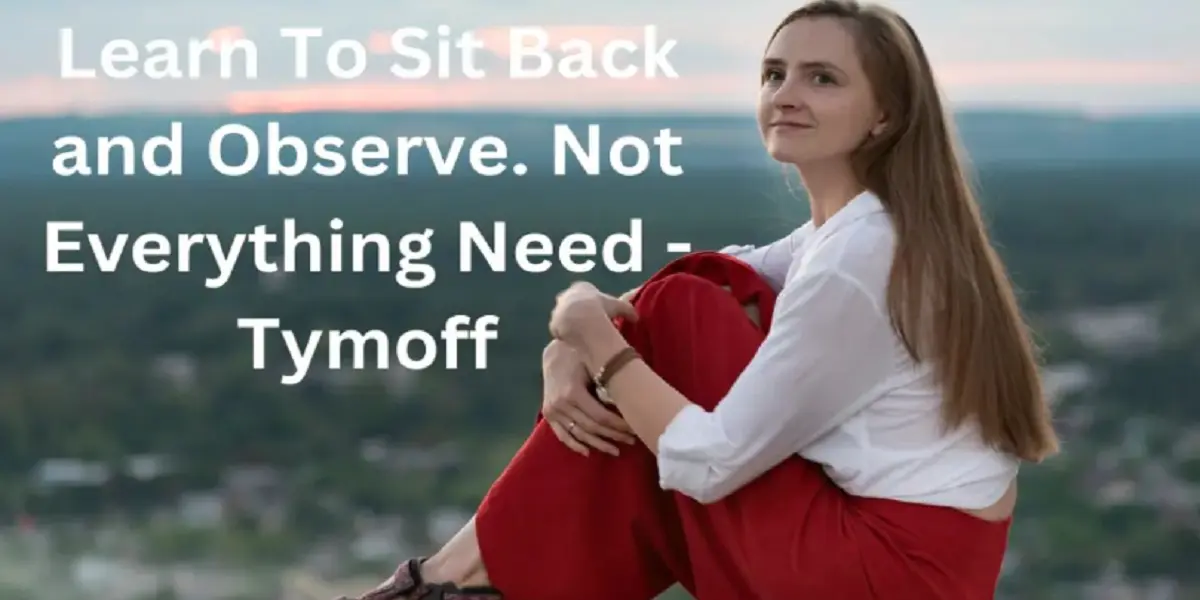In the whirlwind of modern life, it’s easy to feel pressured to act on every thought or situation. This constant state of motion can leave people overwhelmed, exhausted, and disconnected from their own instincts. The wisdom of “learn to sit back and observe; not everything needs action,” as highlighted by learn to sit back and observe. not everything need – tymoff, offers a counterbalance to this fast-paced mindset. It teaches that observation, patience, and discernment can lead to greater clarity and healthier outcomes.
The Power of Observation
Observing, in its purest form, means paying attention to what is happening around and within you without judgment. It encourages awareness and mindfulness, allowing you to process events more thoroughly before deciding on a response.
For example, in a heated discussion, pausing to observe instead of instantly reacting can help you notice the underlying emotions at play. Is the other person angry because they feel unheard? Are you feeling defensive because of past experiences? This act of observation often leads to better communication and resolution.
Observing doesn’t mean passivity; it means active engagement with the present moment. Instead of rushing to fix things or offer solutions, it encourages understanding and insight.
Why Not Everything Needs Action
Learn to sit back and observe. not everything need – tymoff action in every situation can dilute your energy and focus. Not all circumstances require intervention, and sometimes, stepping back allows events to unfold naturally, often resolving themselves without your involvement.
For instance, think about social media debates. Jumping into every argument might feel gratifying at first, but it rarely changes opinions and often adds unnecessary stress. By choosing to observe rather than participate, you conserve energy for matters that genuinely align with your values and goals.
Similarly, in personal relationships, not every disagreement needs a counterargument. By sitting back and observing, you might realize the conflict is more about venting than seeking a solution. Giving others space can create a stronger bond and reduce unnecessary friction.
How to Cultivate the Skill of Observation
- Practice Mindfulness
Mindfulness trains you to focus on the present moment. Spend time each day observing your thoughts and emotions without trying to change them. This practice strengthens your ability to step back in challenging situations. - Listen Actively
When someone speaks, focus entirely on their words, tone, and body language. Avoid formulating a response while they are talking. This habit enhances understanding and builds trust in conversations. - Pause Before Responding
Develop the habit of pausing before reacting. This brief moment allows you to assess whether a response is necessary and, if so, what form it should take. - Keep a Journal
Reflecting on your observations through journaling helps solidify insights. Write about situations where sitting back and observing led to positive outcomes or where action wasn’t necessary. - Embrace Uncertainty
Observing requires comfort with the unknown. Accept that not every situation will have an immediate answer or resolution. This mindset fosters patience and resilience.
Benefits of Sitting Back and Observing
- Improved Decision-Making
Observation helps you gather more information before making decisions. Instead of acting impulsively, you can weigh options and choose a path aligned with your goals. - Reduced Stress
Constant action can feel like carrying the weight of the world. Observing reminds you that some things are beyond your control, allowing you to let go of unnecessary burdens. - Stronger Relationships
When you observe rather than react, you become more empathetic and understanding. This approach strengthens personal and professional relationships by reducing conflict and increasing harmony. - Personal Growth
Observation fosters self-awareness, a key component of personal growth. By understanding your triggers, patterns, and preferences, you can make conscious choices that align with your true self.
Applying This Philosophy in Daily Life
- At Work
In the workplace, the pressure to constantly act can lead to burnout. Instead, practice observing situations, especially during conflicts or high-stress moments. This approach can reveal solutions that aren’t immediately apparent. - In Personal Relationships
Relationships thrive on understanding. By sitting back and observing, you give others the space to express themselves fully, leading to deeper connections and trust. - With Social Media and News
The digital age bombards us with information and opinions, demanding constant reactions. Choose to observe rather than engage with every trend or controversy. This practice protects your mental health and keeps you focused on what truly matters.
Challenges and How to Overcome Them
- Fear of Missing Out (FOMO)
People often feel that sitting back means missing opportunities. Reframe this mindset by recognizing that observation itself is a valuable action. - Impatience
In a culture that celebrates quick fixes, patience can feel counterproductive. Remind yourself that meaningful results often come from thoughtful consideration, not haste. - External Pressure
Society sometimes equates busyness with success. Resist the urge to conform by focusing on the long-term benefits of observation over constant action.
A Balanced Approach
While learn to sit back and observe. not everything need – tymoff observation is powerful, balance is essential. Inaction can sometimes lead to missed opportunities or unresolved issues. The key lies in discernment—knowing when to act and when to observe.
Ask yourself:
- Will this situation benefit from immediate action, or can it wait?
- Am I acting out of impulse or intention?
- What outcome do I hope to achieve, and is action necessary to reach it?
Final Thoughts
The advice to learn to sit back and observe. not everything need – tymoff to sit back and observe; not everything needs action,” encapsulates wisdom that resonates deeply in today’s chaotic world. By embracing observation, you foster clarity, reduce stress, and build stronger connections. This approach doesn’t mean inaction but rather intentionality—choosing when to engage and when to let go.
Incorporate this philosophy into your daily life, and you may find greater peace, purpose, and fulfillment. Tymoff’s message reminds us all to value the power of stillness and trust in the process of life.
